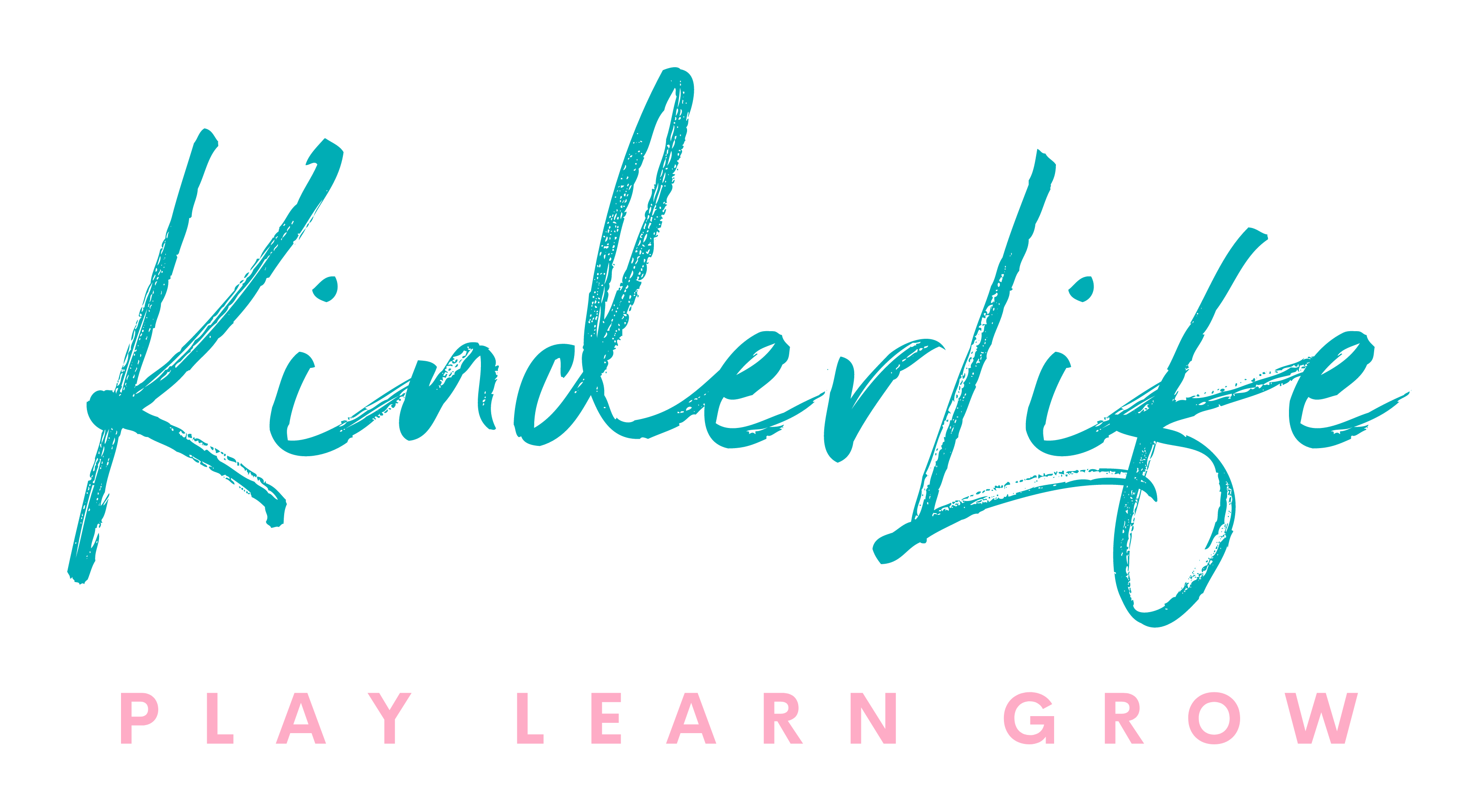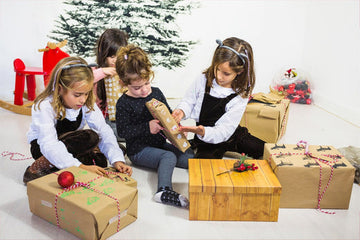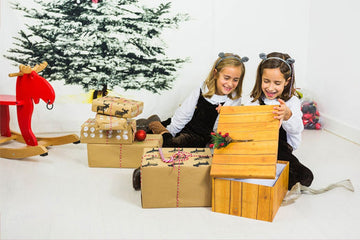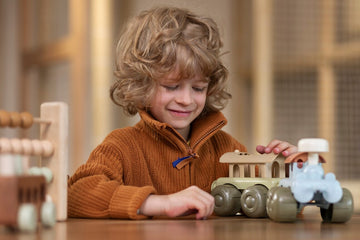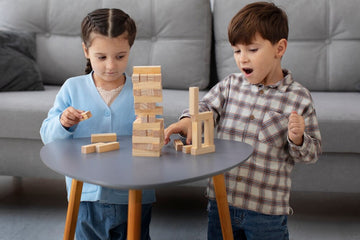Unlocking Imagination: Integrating Pretend Play into the Montessori Approach
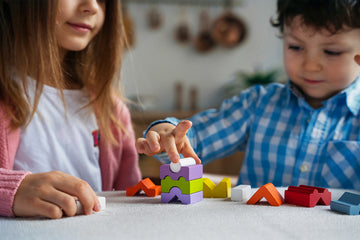
Pretend play is more than a source of amusement for children; it is a critical tool in their cognitive and emotional development. When combined with the Montessori approach, pretend play becomes a powerful method to encourage imagination, social skills, and independence. In this blog post by KinderLife, we will explore how the Montessori method, known for its focus on child-led education and real-life skills, can embrace pretend play to unlock a child's full potential. We will also highlight KinderLife's selection of wooden Montessori teaching and activity toys that support this balance, offering parents in Canada a thoughtful way to foster imaginative learning.
The Montessori Perspective on Pretend Play
The approach of the Montessori method, developed by Dr. Maria Montessori, is based on real-life learning through practical activities. That does not mean that the pretense play of Montessori teachers is ruled out completely. On the contrary, pretend play is a very rich tool for Montessori teachers as long as it is related to the daily life experiences of a child. It is not just fantasy-based scenarios. It reflects real-life tasks and roles that allow children to exhibit adult-like behaviors, like cooking, cleaning, or caring for others.
For example, when children engage in activities like using KinderLife's 32-piece Tool Set or a medical kit, they aren't just acting out scenarios but developing crucial life skills such as problem-solving, communication, and empathy. KinderLife's collection of wooden Montessori teaching and activity toys, such as realistic role-playing sets, perfectly aligns with this philosophy because it encourages structured imaginative play based on real work.
Montessori vs. Other Educational Approaches
The Montessori method clearly differs from the traditional and, indeed, any other alternative educational methods, especially in pretend play. Unlike traditional schooling, where imaginative activities may focus on complete fantasy, the Montessori method encourages a grounded approach that connects imagination with practical life skills.
In contrast, Waldorf education, for example, heavily emphasizes imaginative play as a means of self-expression, often using toys that represent fairy tales or mythical creatures. While both methods value the role of pretend play, Montessori's emphasis remains on purposeful, open-ended activities that reflect the real world.
For parents considering another alternative for education with their children, KinderLife's Montessori wooden toys in Canada can be the best way to develop meaningful pretend play. Above all, these activities and teaching toys work well with Montessori principles but are versatile enough for any home that wants to combine different types of education.
Key Developmental Stages for Pretend Play
Pretend play develops through specific stages as children mature. Each stage allows children opportunities for creating, cognitive growth, and social development. When thoughtfully selected, wooden activity and teaching Montessori toys can enhance a child's imaginative play during these key stages.
1. Infancy (0-2 Years)
At the most elementary level of development, infants learn about the world by familiarizing themselves with their senses. Even though these little balls of energy may not be ready to enact true pretend play, realistic play toys can usher in the concept of imitation. Simple wooden activity toys like KinderLife's Stacking Train Toy and teaching toys like Alphabet Learning On-The-Go help develop fine motor skills, while sensory experiences lay the groundwork for future imaginative play.
2. Toddler Stage (2-3 Years)
At this age, children imitate the ordinary actions they witness through the routine of daily life. Pretend cooking, cleaning, and babysitting are common activities they witness at this stage. KinderLife's Montessori-inspired cooking sets or different wooden Montessori toys like Enchanting Mirror and Dressing Table Set and The Perfect Shopping Cart Toy encourage toddlers to engage in these activities, enhancing their motor skills and understanding of real-world tasks. Parents can guide the imagination of their toddlers gently by providing them with materials they recognize from everyday life (like our exquisite Baby Walker Toy) to have a familiar and feasible experience.
3. Preschool Years (3-5 Years)
During preschool, children's pretend play becomes much more elaborate and sophisticated. As they focus on an action, such as being the lead singer of a band or a builder at a construction site, they now take on a role. KinderLife's Guitar with Plectrum, Interactive Calendar, Weather, and Time Learning Set, wooden tool kits, and other such activity and teaching-based toys allow preschoolers to enact these roles while developing problem-solving skills and creativity. Montessori-style pretend play sets encourage children to look at the world around them in educational yet fun ways.
4. School Age and Beyond (5+ Years)
By school age, children begin to engage in cooperative pretend play, often using more advanced concepts of social interaction. KinderLife's Montessori activity toys, such as wooden medical kits, an Ice Cream Cart Toy, or the 250-piece wooden block sets, are perfect for this age group and will allow them to assume serious roles that would challenge their cognitive and social skills. Such toys support imagination and teamwork; therefore, they are highly recommended for children in all their different forms of group play.
Enhancing Pretend and Fantasy Play with Montessori Toys
Wooden Montessori teaching and activity toys in Canada are intentionally designed to be open-ended, allowing the child to work out their imagination as they link real-life skills.
Some of the best categories of wooden Montessori toys that support imaginative play include:
1. Dress-Up Costumes and Accessories
Role-play costumes foster a child's ability to embody different characters. From chefs to doctors, KinderLife's wooden Beauty Case, Mirror, and Dressing Table Set are designed with a Montessori focus, encouraging children to dress up in roles that mirror their real-world observations. These wooden activity toys are substantial enough to ignite a child's creativity without exposing him to some surplus details.
2. Playsets
Children often love pretending they are adults managing their own households and businesses. KinderLife's Tack Zap Farm Play Set, Magnetic Block Sets, and 3-Storey Dollhouse allow children to play pretend. These toys help children feel a sense of responsibility and pride in "managing" their space, just like the adults they observe.
3. Tool Kits and Workbenches
The Montessori educational emphasis on practical activities like building and fixing makes pretend tool kits and workbenches perfect for building a child's creativity. KinderLife's collection of tool kits, like The Tool Bench and Table Top Workbench, lets children imagine themselves as carpenters or engineers, teaching them the art of problem-solving while enhancing their dexterity and spatial sense.
4. Medical Kits for Imaginative Play
Role-playing as a doctor or nurse, or maybe as a cashier, is a classic form of imaginative play, and KinderLife's wooden medical kits, Toy Cash Register, and interactive Lacing Blocks Transportation set provide the perfect tools for children to explore this role. These wooden activities and teaching toy kits allow children to learn about caregiving, empathy, and health while reinforcing the real-life experience taught by the Montessori teaching philosophy.
The Importance of Open-Ended Toys in Pretend Play
One of the hallmarks of Montessori education is the use of open-ended toys that can be manipulated in multiple ways, allowing children to use their imaginations freely. Open-ended toys—such as KinderLife's blocks, puzzles, and stacking toys—do not prescribe a single way to play. Instead, they encourage creativity, problem-solving, and independent thinking.
Children playing with open-ended wooden Montessori toys can use them in infinite ways, turning a simple block into a car one moment and a bridge the next. By offering children these types of toys, parents can foster imagination and critical thinking, core elements of Montessori education.
Final Thoughts: Embracing Pretend Play in Montessori Education
When aligned with Montessori principles, pretend play offers children a unique blend of imagination and real-world learning. Focusing on toys and activities that reflect everyday life can help children develop the skills necessary for independence, creativity, and emotional growth. KinderLife's carefully curated selection of Montessori toys in Canada—from cooking sets to tool kits—provides parents with the tools they need to inspire their children's imaginations while staying true to the Montessori method.
Explore KinderLife's full range of Montessori wooden toys and activity toys to support your child's imaginative growth. Whether you're looking for Montessori toys in Canada or simply wish to provide your child with the best tools for pretend play, KinderLife offers quality products designed to enrich your child's educational experience. Browse the collection today and unlock your child's potential through purposeful play.
